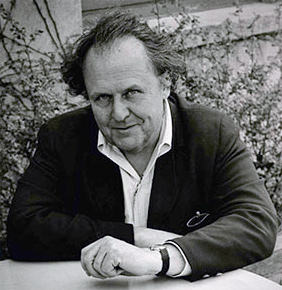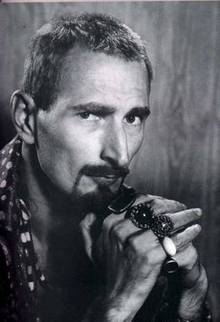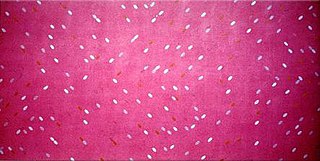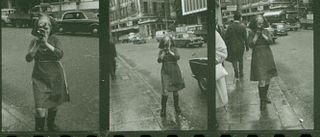
Batman Dracula is a 1964 black and white American superhero fan film produced and directed by Andy Warhol without the permission of DC Comics, who owns the character Batman.
An underground film is a film that is out of the mainstream either in its style, genre or financing.

Mary Harron is a Canadian film director and screenwriter.
Celsius 41.11 is a 2004 political documentary film inspired by, and partially in response to Michael Moore's film Fahrenheit 9/11. The title was chosen because, according to the makers of the movie, 41.11 °C is "The Temperature at Which the Brain Begins to Die", which is the film's tag-line.

Emile Francisco de Antonio was an American director and producer of documentary films, usually detailing political, social, and counterculture events circa 1960s–1980s. He has been referred to by Randolph Lewis as, "…the most important political filmmaker in the United States during the Cold War."

Factory Girl is a 2006 American biographical film directed by George Hickenlooper. It is based on the rapid rise and fall of 1960s underground film star and socialite Edie Sedgwick, known for her association with the artist Andy Warhol.

Jack Smith was an American filmmaker, actor, and pioneer of underground cinema. He is generally acclaimed as a founding father of American performance art, and has been critically recognized as a master photographer, though his photographic works are rare and remain largely unknown.

René Rivera,, known professionally as Mario Montez, was one of the Warhol superstars, appearing in thirteen of Andy Warhol's underground films from 1964 to 1966. He took his name as a male homage to the actress Maria Montez, an important gay icon in the 1950s and 1960s. Before appearing in Warhol's films, he appeared in Jack Smith's underground films Flaming Creatures and Normal Love. Montez also stars in the Ron Rice film Chumlum, made in 1964. Mario Montez, was "a staple in the New York underground scene of the 1960s and '70s."

Fuck is a 2005 American documentary film by director Steve Anderson about the word "fuck". The film argues that the word is an integral part of societal discussions about freedom of speech and censorship. It examines the term from perspectives which include art, linguistics, society and comedy, and begins with a segment from the 1965 propaganda film Perversion for Profit. Scholars and celebrities analyze perceptions of the word from differing perspectives. Journalist Sam Donaldson talks about the versatility of the word, and comedian Billy Connolly states it can be understood despite one's language or location. Musician Alanis Morissette comments that the word contains power because of its taboo nature. The film features the last recorded interview of author Hunter S. Thompson before his suicide. Scholars, including linguist Reinhold Aman, journalism analyst David Shaw and Oxford English Dictionary editor Jesse Sheidlower, explain the history and evolution of the word. Language professor Geoffrey Nunberg observes that the word's treatment by society reflects changes in our culture during the 20th century.

Wesley Morris is an American film critic and podcast host. He is currently critic-at-large for The New York Times, as well as co-host, with Jenna Wortham, of the New York Times podcast Still Processing. Previously, Morris wrote for The Boston Globe, then Grantland. He won the 2012 Pulitzer Prize for Criticism for his work with The Globe and the 2021 Pulitzer Prize for Criticism for his New York Times coverage of race relations in the United States, making Morris the only writer to have won the Criticism prize more than once.
Steven Starr is the producer of FLOW: For Love Of Water, and the founder of Revver.

Audience of One is a 2007 documentary film directed by Michael Jacobs. It was premiered on 9 March 2007 at South by Southwest in Austin, Texas.

Lawrence M. "Larry" Poons is an American abstract painter. Poons was born in Tokyo, Japan, and studied from 1955 to 1957 at the New England Conservatory of Music, with the intent of becoming a professional musician. After seeing Barnett Newman's exhibition at French and Company in 1959, he gave up musical composition and enrolled at the School of the Museum of Fine Arts, Boston. He also studied at the Art Students League of New York. Poons taught at The Art Students League from 1966 to 1970 and currently teaches at the League.

Rodney Bingenheimer is an American radio disc jockey who is best known as the host of Rodney on the ROQ, a radio program that ran on the Los Angeles rock station KROQ-FM from 1976 to 2017. In the early 1970s, he also managed a Los Angeles nightclub called Rodney Bingenheimer's English Disco.

Tally Brown was a singer and actress who was part of the New York underground performance scene, particularly Andy Warhol's "Factory" and who appeared in or was the subject of films by Andy Warhol and Rosa von Praunheim. She was born and died in New York City.

For the Love of Movies: The Story of American Film Criticism is a 2009 documentary film dramatizing a hundred years of American film criticism through film clips, historic photographs, and on-camera interviews with many of today’s important reviewers, mostly print but also Internet. It was produced by Amy Geller, written and directed by long-time Boston Phoenix film critic Gerald Peary, and narrated by Patricia Clarkson. Critics featured include Roger Ebert of The Chicago Sun-Times, A.O. Scott of The New York Times, Lisa Schwarzbaum of Entertainment Weekly, Kenneth Turan of The Los Angeles Times, and Elvis Mitchell, host of the public radio show The Treatment.
Mary Jordan-Kross is a Canadian-American filmmaker and activist.
Blonde Cobra is a 1963 short film directed by experimental filmmaker Ken Jacobs. Footage for the unique and at the time controversial film was shot by Bob Flieshner. Marc Siegel states that the 33-minute film is "generally considered to be one of the masterpieces of the New York underground film scene", and that it is a "fascinating audio-visual testament to the tragicomic performance of the inimitable Jack Smith", who was a photographer and filmmaker and "queer muse" in New York avant-garde art in the 1960s and 1970s.

Barbara Rubin (1945–1980) was an American filmmaker and performance artist. She is best known for her landmark 1963 underground film Christmas on Earth.

Piero Heliczer was an Italian-American poet, publisher, actor and filmmaker associated with the New American Cinema.















